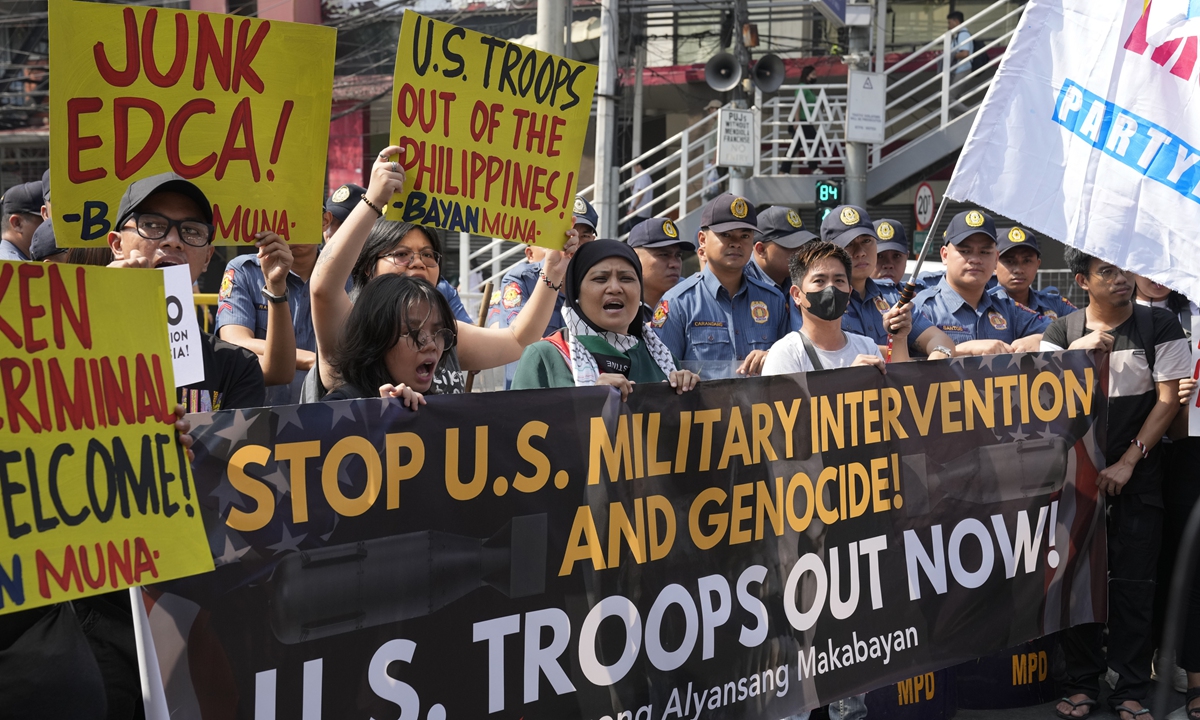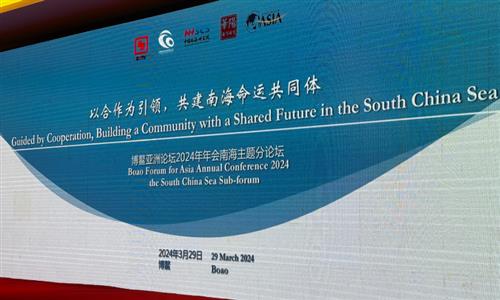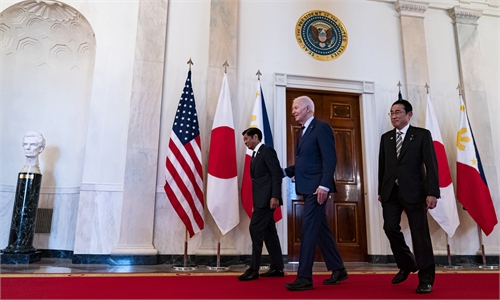Marcos rules out more military bases for US, 'pretending to be a stabilizer' after provocation

Protesters shout slogans against the visit of U.S. Secretary of State Antony Blinken during a rally near the Malacanang presidential palace in Manila, Philippines on Tuesday, March 19, 2024. Photo: VCG
After a summit with US and Japanese leaders in Washington which is regarded as primarily targeted at China, Philippine President Ferdinand Romualdez Marcos Jr said his government has no plan to give US forces access to more military bases in the Philippines. Chinese analysts commented that faced with regional concerns and domestic opposition, Marcos is pretending his government is a "stabilizer" at least on the surface, rather than a "troublemaker," however, Manila's provocation is unlikely to stop at any time soon.
According to the AP, Marcos made the remarks during a forum with Manila-based foreign correspondents on Monday. He said his government "has no plans to create any more bases or give access to any more bases."
In February 2023, Marcos granted the US access to four new military bases," bringing to nine the number of military bases that US troops can rotate through, build facilities and store defense equipment and supplies under the "Enhanced Defense Cooperation Agreement (EDCA). One of the bases is only 400 kilometers from China's Taiwan region, according to media reports.
Asked if he was concerned that allowing US military access to Philippine bases had provoked Chinese actions, Marcos said that giving the US military access to Philippine bases is "not aimed at provoking China" but is a reaction to "aggressive actions we had to deal with" in the South China Sea.
Marcos also mentioned the recent disputes in the South China Sea and smeared China, noting that it is crucial that the media continues to expose these actions that threaten the peace and stability of the region. It is worth mentioning that Manila has invited Western reporters board its vessels when Manila needs to spread its image as "a victim" in the face of China's "assertive actions."
Chen Xiangmiao, director of the World Navy Research Center at the National Institute for South China Sea Studies, told the Global Times on Tuesday that Marcos is attempting to sway other countries in the region that Manila is trying to calm down the situation.
He portrays himself as a nice guy that is trying to maintain regional stability in front of the media, Chen said.
Marcos remarks came after the first-ever US-Japan-Philippines summit hosted by US President Joe Biden on Thursday in Washington, DC, in which the three nations announced they will deepen military cooperation to counter "China's threats." Biden asked Congress for a further $128 million for infrastructure projects at the current base sites. Manila is also promoting a mutual military visit agreement with Tokyo.
After the summit, geopolitical competition and bloc confrontation in the Asia-Pacific is on the rise, and the risk of maritime friction is also increasing, said Ding Duo, deputy director of the Institute of Maritime Law and Policy at the China Institute for South China Sea Studies.
The Philippines, encouraged and supported by the US and Japan, will not stop its aggressive and provocative actions at sea in the short term, Ding said, noting that the Philippines may even make more infringements and provocative measures in public opinion, jurisprudence and on diplomatic occasions.
Both experts said that Marcos' remarks are also in response to pressure from domestic opposition and anti-war groups that are worried the Philippines will become further involved in a major power confrontation between the US and China.
In a recent interview with the Global Times, former Philippine president Rodrigo Duterte said there are too many military bases for the US troops in Philippines, which he always objected to. He warned that the "US will not die for us."
Whether there will be more military bases in the Philippines depends on if the US puts new demands on the Philippines and whether the US meets some of the conditions Manila is asking for, as there were interests exchanges behind every single base, Chen said.
According to Ding, with the new bases still under construction, the demand for more military bases in the Philippines is not urgent. In addition, the procedure of adding a new base is complicated, not only in terms of the US and the Philippines themselves at home, but also due to technical issues between the two countries, which makes it less feasible in the short term.
For instance, building a new site needs a huge amount of funds and human resources, and it also need to be approved by Congress, Ding said.
Ding stressed that in response to the provocation of the Philippines and the intervention of countries outside the region, China has enough strength to safeguard territorial sovereignty and maritime rights and interests, which is also the fundamental guarantee for peace and stability in the South China Sea.



